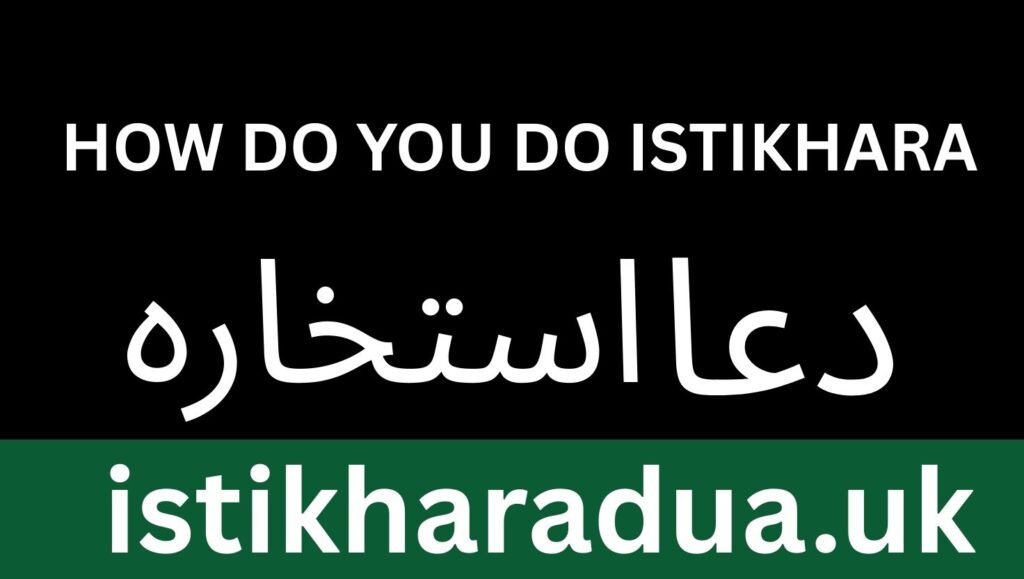
how do you do istikhara
Istikhara is an incredibly Islamic practice that gives guidance from Allah when facing life’s challenges. When you’re making a decision about the marriage of your choice, a career shift or another major decision, Istikhara helps align your choices to Allah’s wisdom. This comprehensive guide will explain how to do Istikhara step-by-step, what is the significance in Istikhara, the significance of Istikhara dua, as well as practical strategies to make sure the prayer you pray for is successful. You may be searching to find “how to do Istikhara,” “Istikhara dua,” or searching online for information about Istikhara blogs, this one will give you clarity and spiritual understanding.
What is Istikhara? how do you do istikhara?
Istikhara which is derived from Arabic term “khayr” (meaning goodness) is a form of prayer seeking wisdom and goodwill from Allah. It is an important Sunnah practice that was taught by the Prophet Muhammad (peace be with his name) to aid Muslims make choices when they are unsure of the most effective course of action. Istikhara does not concern forecasting the future or getting an answer to your question in a dream. It is about asking Allah’s direction to determine the best option for your spiritual and worldly life.
Istikhara is beautiful because Istikhara is in its simplicity and faith in Allah’s wisdom. When you perform Istikhara you entrust your choice to Allah asking Allah to guide you towards what is best for you and to keep you safe from danger. It’s a powerful spiritual tool that can bring peace and clarity. It also helps to build confidence regardless of the difficult situations.
Why is Istikhara Important?
Istikhara has many functions that make it a vital method of practice Muslims:
- Clarity in decision-making It assists in removing doubt and confusion, leading you towards the most effective decision.
- Enhancing faith: Istikhara reinforces your faith in Allah’s plan for you by reminding you that Allah knows what you are not doing.
- Intimate Peace The act of trusting your choice to Allah will bring peace and security regardless of the result.
- Protection from harm In seeking Allah’s guidance, you seek to be protected from decisions which could result in negative outcomes.
- Alignment with God’s Will: Istikhara ensures your decisions are in line with what’s most beneficial in your life (worldly existence) and your akhirah (hereafter).
When Should You Perform Istikhara?
Istikhara is suitable for any situation in which you need clarity in a life decision or a more minor issue. The most common situations are:
- Marriage Choices: Deciding whether or not to accept a marriage proposal or opt for to be a life partner.
- Options for Careers The process of choosing one’s job, changing career paths, or seeking further education.
- Financial Choices such as buying or selling a property, investing in a company or making large purchases.
- Relocation or Travel: Deciding if you want to relocate to a different city or in a different country.
- Personal Problems Conflict resolution or deciding on the relationships you have with others or your personal goals.
Istikhara isn’t limited to major decisions. It can be practiced anytime you are uncertain and seek guidance from Allah.
How to Perform Istikhara: Step-by-Step Guide
The act of performing Istikhara is simple, and requires faith, sincerity and the observance of the Sunnah. Here’s how:
Step 1: Make Wudu (Ablution)
Before a prayer, it is important to be clean. Do wudu, the practice of cleansing, in order to prepare your body and mind for spiritual. Make sure you’re at a purity level and purity, which will increase your concentration and relationship with Allah.
Step 2: Offer Two Rak’ahs of Sunnah Prayer
Do two sets (rak’ahs) of prayer separated from the obligatory prayers. They can be done anytime, but some prefer to perform Istikhara following prayer. Isha (night) night prayer to save time. When performing these rak’ahs
- The first time you recite the rak’ah repeat Surah Al-Fatiha. Then, recite Surah Al-Kafirun.
- The second time you recite the rak’ah say Surah Al-Fatiha and then Surah Al-Ikhlas.
- Then, complete the prayer using the traditional steps, which include the ruku (bowing) as well as sujood (prostration) and the tashahhud,
Step 3: Recite the Istikhara Dua
After completing the two rak’ahs and saying the salam to end the prayer, recite the Istikhara dua with sincerity. This dua is the heart of the Istikhara prayer, as it directly asks Allah for guidance. Below is the dua in Arabic, its transliteration, and its English translation:
Arabic Dua e Istikhara: اللَّهُمَّ إِنِّي أَسْتَخِيرُكَ بِعِلْمِكَ، وَأَسْتَقْدِرُكَ بِقُدْرَتِكَ، وَأَسْأَلُكَ مِنْ فَضْلِكَ الْعَظِيمِ، فَإِنَّكَ تَقْدِرُ وَلَا أَقْدِرُ، وَتَعْلَمُ وَلَا أَعْلَمُ، وَأَنْتَ عَلَّامُ الْغُيُوبِ، اللَّهُمَّ إِنْ كُنْتَ تَعْلَمُ أَنَّ هَذَا الْأَمْرَ خَيْرٌ لِي فِي دِينِي وَمَعَاشِي وَعَاقِبَةِ أَمْرِي، فَاقْدُرْهُ لِي وَيَسِّرْهُ لِي ثُمَّ بَارِكْ لِي فِيهِ، وَإِنْ كُنْتَ تَعْلَمُ أَنَّ هَذَا الْأَمْرَ شَرٌّ لِي فِي دِينِي وَمَعَاشِي وَعَاقِبَةِ أَمْرِي، فَاصْرِفْهُ عَنِّي وَاصْرِفْنِي عَنْهُ، وَاقْدُرْ لِيَ الْخَيْرَ حَيْثُ كَانَ ثُمَّ أَرْضِنِي بِهِ
Transliteration: Allahumma inni astakhiruka bi‘ilmika, wa astaqdiruka biqudratika, wa as’aluka min fadlika al-‘azim, fa innaka taqdiru wala aqdiru, wa ta‘lamu wala a‘lamu, wa anta ‘allamul-ghuyub. Allahumma in kunta ta‘lamu anna hadhal-amra khayrun li fi dini wa ma‘ashi wa ‘aqibati amri, faqdurhu li wa yassirhu li thumma barik li fihi. Wa in kunta ta‘lamu anna hadhal-amra sharrun li fi dini wa ma‘ashi wa ‘aqibati amri, fasrifhu ‘anni wasrifni ‘anhu, waqdur li al-khayra haythu kana thumma ardini bihi.
Translation: “O Allah, I seek Your guidance through Your knowledge, and I seek Your power through Your ability, and I ask You from Your immense favor, for You have power while I have none, and You know while I do not, and You are the Knower of the unseen. O Allah, if You know that this matter is good for me in my religion, my livelihood, and the outcome of my affairs, then decree it for me, make it easy for me, and bless me in it. And if You know that this matter is harmful to me in my religion, my livelihood, and the outcome of my affairs, then turn it away from me and turn me away from it, and decree for me what is good wherever it may be, and make me content with it.”
Note: When reciting the dua, mention the specific matter you’re seeking guidance for (e.g., “this marriage,” “this job”) in place of “this matter” (hadhal-amra).
Step 4: Trust Allah and Await Guidance
After reciting the dua, place your trust in Allah. Guidance may come in various forms, such as a sense of peace, clarity in your heart, circumstances aligning naturally, or even obstacles that deter you from a harmful choice. Be patient and attentive to your feelings and surroundings in the days following the prayer.
Tips for an Effective Istikhara
To ensure your Istikhara is meaningful and effective, consider the following:
- Sincerity is Key: Approach Istikhara with a pure heart and genuine trust in Allah’s wisdom. Avoid performing it with a preconceived decision or bias.
- Repeat if Needed: If you don’t feel clarity after one prayer, you may repeat Istikhara up to seven times, as advised by scholars.
- Avoid Rushing: Don’t expect immediate answers. Guidance may unfold gradually through events, feelings, or new information.
- Consult Others: Istikhara complements practical decision-making. Seek advice from trusted family, friends, or scholars alongside the prayer.
- Reflect on Signs: Pay attention to your heart’s inclination, dreams (if they occur), or external signs like ease or obstacles in your path.
- Stay Patient: Trust that Allah’s timing is perfect. Even if the outcome isn’t what you expected, it is what’s best for you.
Common Misconceptions About Istikhara
- “Istikhara Requires a Dream”: Many believe Istikhara must result in a dream with clear symbols. While dreams can be a form of guidance, they are not mandatory. Guidance often comes through feelings of ease or unease, or through real-world events.
- “Istikhara Guarantees a Specific Outcome”: Istikhara is not about forcing a particular result but about seeking what is best according to Allah’s knowledge.
- “Istikhara is Only for Major Decisions”: While often used for significant choices, Istikhara can be performed for any matter where guidance is needed.
- “You Need a Scholar to Perform Istikhara”: Istikhara is a personal prayer that anyone can perform after learning the dua and steps.
Online Istikhara: A Modern Solution
In today’s digital age, online Istikhara services have gained popularity, especially for those who seek quick guidance or lack access to local scholars. These services typically offer:
- Guidance on Performing Istikhara: Websites and apps provide the dua, its translation, and step-by-step instructions.
- Consultation with Scholars: Some platforms connect users with Islamic scholars who can perform Istikhara on their behalf or offer advice.
- Interpretation of Signs: Online services may help interpret feelings or signs post-Istikhara, though personal reflection is encouraged.
While online Istikhara can be helpful, it’s best to learn and perform the prayer yourself, as it fosters a direct connection with Allah. Use online resources as a supplement, not a replacement, for your spiritual practice.
FAQs About Istikhara
Q1: What is the best time to perform Istikhara? Istikhara can be performed at any time, as it is a voluntary prayer. However, many prefer to do it after Isha prayer or during the last third of the night, when prayers are more likely to be accepted.
Q2: How many times should I perform Istikhara? You may perform Istikhara once or repeat it up to seven times if you don’t feel clarity. Each prayer should be approached with renewed sincerity.
Q3: What if I don’t see a clear sign after Istikhara? Guidance may not always come as a dramatic sign. Look for subtle indications, such as a sense of peace, ease in pursuing a choice, or obstacles that deter you from a harmful path. If unsure, repeat the prayer and remain patient.
Q4: Can I perform Istikhara in my native language? The dua is traditionally recited in Arabic for its authenticity, but understanding its meaning in your language enhances sincerity. You can reflect on the decision in your native language before or after the dua.
Q5: Can Istikhara be performed for someone else? Yes, you can perform Istikhara on behalf of someone else, but it’s ideal for the person facing the decision to pray themselves, as it strengthens their connection with Allah.
Q6: Is Istikhara only for Muslims? Istikhara is an Islamic practice rooted in faith in Allah. It is intended for Muslims who believe in Allah’s guidance and seek His wisdom.
The Spiritual Power of Istikhara
Istikhara is more than a ritual; it’s a profound act of submission to Allah’s will. The dua e Istikhara reminds us of our limitations and Allah’s infinite knowledge and power. By reciting it, you acknowledge that only Allah knows what is best for your present and future. This surrender brings immense peace, as it shifts the burden of decision-making from your shoulders to Allah’s divine plan.
The prayer also fosters patience and trust. In a world where we seek instant answers, Istikhara teaches us to wait for Allah’s timing and to accept His decree, even if it differs from our desires. Over time, regular Istikhara can deepen your spiritual connection, making it a source of comfort in all aspects of life.
Conclusion
Istikhara is a timeless Islamic practice that offers clarity, peace, and divine guidance in moments of uncertainty. By following the simple steps—performing wudu, praying two rak’ahs, reciting the Istikhara dua, and trusting Allah—you open your heart to the best outcome. Whether you perform Istikhara at home or seek online guidance, the key is sincerity and faith in Allah’s wisdom.
As you incorporate Istikhara into your life, you’ll find it to be a spiritual compass, guiding you through decisions big and small. Let the dua e Istikhara be your anchor, and trust that Allah will lead you to what is best. May your path be blessed with clarity and ease.
